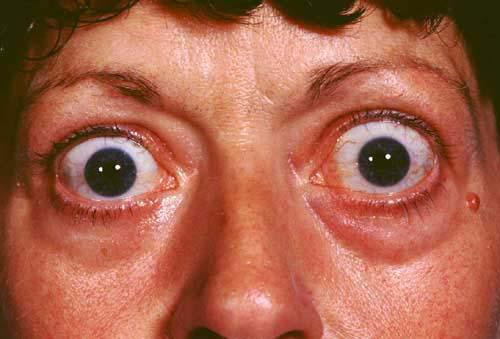Definisi
Goiter atau penyakit gondok adalah kondisi medis yang ditandai dengan pembesaran atau pembengkakan kelenjar tiroid di leher. Karena terjadi pembengkakan pada kelenjar tiroid, maka salah satu gejalanya yang tampak yaitu munculnya benjolan di leher.
Kelenjar tiroid merupakan kelenjar kecil berbentuk seperti sayap kupu-kupu dan terletak pada bagian depan leher yang ditutupi kulit dan otot. Sedangkan pada pria kelenjar tiroid terletak di bawah jakun.
Kelenjar tiroid berfungsi mengeluarkan hormon yang disebut dengan tiroksin (atau disebut juga dengan T4) dan triiodothironin (atau dikenal sebagai T3) yang membantu fungsi tubuh, seperti:
- Metabolisme
- Mengatur suhu tubuh
- Mengontrol detak jantung
- Mengatur suasana hati (mood)
- Membantu dalam sistem pencernaan
Goiter sering dihubungkan dengan jumlah hormon tiroid yang tidak normal di dalam tubuh baik terlalu tinggi (hipertiroidisme) ataupun terlalu rendah (hipotiroidisme). Namun, goiter juga dapat terjadi dengan nilai hormon tiroid normal (eutiroidisme).
Penyebab
Penyebab utama terjadinya goiter adalah kekurangan (defisiensi) yodium. Yodium memiliki peranan penting yaitu untuk membantu kelenjar tiroid menghasilkan hormon tiroid. Ketika tubuh tidak memiliki cukup yodium, maka kelenjar tiroid harus bekerja lebih keras untuk membuat hormon tiroid, hal inilah yang menyebabkan kelenjar membesar.
Selain karena kekurangan yodium, ada beberapa penyebab lain:
Penyakit Graves
Penyakit Graves atau Graves' disease adalah penyakit autoimun yang menyebabkan produksi hormon tiroid berlebih (hipertiroidisme). Produksi hormon tiroid yang berlebihan dapat menyebabkan pembesaran pada kelenjar tiroid.
Penyakit Hashimoto
Penyakit Hashimoto adalah penyakit autoimun yang dapat menyebabkan peradangan pada kelenjar tiroid. Proses peradangan ini mengakibatkan kelenjar tiroid tidak mampu menghasilkan hormon tiroid dalam jumlah yang cukup. Hal ini dapat menyebabkan tubuh kekurangan hormon tiroid (hipotiroidisme).
Tiroiditis
Tiroiditis adalah peradangan pada kelenjar tiroid yang dapat menyebabkan goiter. Kondisi ini berbeda dengan penyakit Hashimoto, tiroiditis dapat disebabkan oleh infeksi virus.
Kanker Tiroid
Kanker dapat memengaruhi kelenjar tiroid, dimana dapat menyebabkan pembengkakan di satu sisi kelenjar. Kanker tiroid biasanya bersifat ganas.
Kehamilan
Hormon HCG (human chorionic gonadotropin) merupakan hormon yang diproduksi tubuh selama masa kehamilan. Diduga hormon ini dapat mengakibatkan kelenjar tiroid menjadi terlalu aktif dan ukurannya jadi sedikit membesar.
Baca Juga: Penyakit Tiroiditis - Definisi, Penyebab, Gejala, dan Tata Laksana | AI Care (ai-care.id)
Faktor Risiko
Goiter dapat mengenai siapa saja. Namun, terdapat beberapa faktor yang dapat meningkatkan risiko seseorang mengalami goiter, diantaranya:
- Diet rendah garam beryodium
- Berusia di atas 40 tahun
- Berjenis kelamin perempuan
- Riwayat keluarga dengan goiter atau penyakit tiroid lainnya
- Memiliki kondisi yang dapat menurunkan kadar yodium dalam tubuh
- Kehamilan atau menopause
- Menjalani terapi radiasi pada area leher atau dada
- Beberapa obat - obatan seperti obat jantung (amiodarone) dan obat anti-psikotik (lithium)
Gejala
Gejala dari goiter yang nampak berupa adanya tonjolan dengan ukuran yang bervariasi dari kecil hingga berukuran sangat besar. Kebanyakan goiter tidak menimbulkan rasa nyeri, tetapi bila Anda mengalami tiroiditis, goiter dapat memberikan rasa nyeri.
Gejala utama dari goiter meliputi:
- Adanya benjolan pada leher depan, di bawah jakun (pada pria)
- Perasaan tertekan atau sesak pada area tenggorokan
- Suara serak
- Pembengkakan pembuluh darah vena di leher
- Kebingungan atau pusing ketika mengangkat tangan ke atas kepala.
Gejala lainnya yang mungkin muncul (namun jarang), antara lain:
- Kesulitan bernapas atau sesak napas (sampai timbul suara mengi)
- Batuk
- Kesulitan menelan
Jika goiter disertai dengan kondisi hipertiroid (kadar hormon tiroid terlalu tinggi), gejalanya meliputi:
- Keringat berlebihan
- Penurunan berat badan yang tidak disengaja
- Jantung berdebar-debar
- Peningkatan nafsu makan (mudah lapar)
- Tremor, biasanya terlihat seperti tangan dan kaki yang gemetar
Jika goiter disertai dengan kondisi hipotiroid (kadar hormon terlalu rendah), gejalanya meliputi:
- Kelelahan
- Peningkatan berat badan
- Intoleransi terhadap dingin
- Kulit kering atau rambut kering dan tipis
- Detak jantung lambat
Diagnosa
Untuk mendiagnosis goiter, dokter akan melakukan pemeriksaan fisik pada leher. Pada saat pemeriksaan, dokter akan merasakan adanya benjolan atau pembesaran pada kelenjar tiroid di leher.
Adanya goiter dapat mengindikasikan adanya masalah pada kelenjar tiroid, sehingga dokter akan mencari tahu penyebabnya. Berikut beberapa pemeriksaan yang dapat dilakukan:
Pemeriksaan Darah
Pemeriksaan darah meliputi tes fungsi tiroid dan tes antibodi. Tes fungsi tiroid dilakukan dengan mengukur kadar hormon tiroid seperti TSH (Thyroid Stimulating Hormone), T4 dan T3.
Sedangkan, tes antibodi dilakukan untuk mendeteksi adanya penyakit autoimun pada tiroid, seperti penyakit Hashimoto atau penyakit Graves.
USG Tiroid
Dengan melakukan pemeriksaan USG tiroid, dokter dapat melihat ukuran kelenjar tiroid dan memeriksa apakah ada kelainan lainnya.
Scan Tiroid
Pada pemeriksaan ini dokter akan menyuntikkan bahan radioaktif, kemudian dengan kamera khusus yang terhubung langsung dengan komputer dokter dapat melihat gambaran tiroid di layar komputer. Melalui pemeriksaan ini dokter dapat menilai ukuran tiroid dan kinerjanya.
Biopsi
Pemeriksaan ini dilakukan dengan mengambil sampel jaringan untuk selanjutnya diperiksa lebih lanjut di laboratorium. Pemeriksaan biopsi bertujuan untuk melihat ada atau tidaknya sel kanker.
CT Scan atau MRI
Pemeriksaan ini dilakukan jika goiter memiliki ukuran sangat besar atau menyebar ke area dada. CT scan atau MRI dapat mengukur pembesaran tiroid dan melihat penyebaran dari goiter.
Baca Juga: Penyakit Hipertiroidisme - Definisi, Penyebab, Gejala, dan Tata Laksana | AI Care (ai-care.id)
Tata Laksana
Dokter akan menentukan pengobatan berdasarkan ukuran, kondisi goiter, dan gejala yang muncul. Pengobatan juga didasarkan pada masalah kesehatan yang ikut berkontribusi pada munculnya goiter.
Jika goiter berukuran kecil dan kelenjar tiroid berfungsi dengan baik, maka dokter akan menyarankan Anda untuk memantau perkembangannya dengan rutin melakukan pemeriksaan.
Obat-obatan
- Levothyroxine merupakan obat untuk mengatasi kondisi hipotiroid (kekurangan hormon tiroid). Dokter akan meresepkan obat ini jika Anda memiliki goiter dengan hipotiroid.
- Anti-tiroid merupakan obat untuk mengatasi kondisi goiter dengan hipertiroid (kelebihan hormon tiroid). Obat anti-tiroid seperti methimazole dan propylthiouracil.
- Kortikosteroid merupakan obat untuk meredakan peradangan. Obat ini diresepkan dokter jika goiter disebabkan oleh tiroiditis.
Terapi Yodium Radioaktif
Pengobatan ini berguna untuk mengatasi kondisi hipertiroid (kelenjar tiroid terlalu aktif). Yodium radioaktif bekerja dengan cara menghancurkan sel-sel tiroid sehingga ukuran kelenjar tiroid dapat mengecil.
Namun, pengobatan ini memiliki efek samping yaitu menyebabkan hipotiroid sehingga Anda perlu mendapatkan terapi penggantian hormon.
Operasi
Prosedur pembedahan dapat disarankan dokter jika goiter berukuran besar dan menyebabkan masalah pernapasan ataupun kesulitan menelan. Dokter akan melakukan tindakan operasi pengangkatan pada seluruh atau sebagian kelenjar tiroid yang disebut tirodektomi. Operasi juga harus dilakukan apabila ditemukannya sel kanker.
Komplikasi
Goiter yang muncul tanpa gejala biasanya tidak menyebabkan komplikasi dikemudian hari. Anda mungkin hanya merasa tidak percaya diri dengan adanya benjolan di leher. Namun, goiter yang ukurannya semakin besar seiring waktu, dapat menyebabkan masalah seperti menghalangi jalannya napas dan perubahan terhadap suara.
Jika goiter disertai dengan hipertiroid, hipotiroid, atau masalah pada produksi hormon, hal ini dapat menyebabkan berbagai komplikasi bagi beberapa organ tubuh termasuk jantung (gagal jantung).
Pencegahan
Goiter disebabkan oleh kekurangan yodium (goiter sederhana) dimana tipe ini dapat dicegah. Mengonsumsi makanan seperti ikan, produk susu, dan garam beryodium dalam jumlah yang cukup dapat mencegah tipe goiter ini.
Namun, Anda tidak disarankan untuk mengonsumsi suplemen yodium atau suplemen lain karena mungkin dapat menyebabkan efek samping yang tidak diinginkan. Anda dapat berkonsultasi ke dokter sebelum mengonsumsi suplemen tertentu.
Kapan Harus ke Dokter ?
Konsultasikan ke dokter bila Anda mengalami gejala goiter, karena kondisi tersebut dapat menjadi tanda awal dari hipertiroid atau hipotiroid yang membutuhkan pengobatan. Goiter mungkin tidak bergejala, tetapi jika goiter berukuran besar disertai dengan masalah pernapasan atau perubahan suara, segera ke dokter.
Lakukan pemeriksaan rutin jika Anda sudah didiagnosa dengan goiter sehingga dokter dapat memantau kondisi Anda.
Mau tahu informasi seputar penyakit lainnya? Cek di sini, ya!
- dr Nadia Opmalina
Goiter. (2021). Retrieved 14 February 2023, from https://www.mayoclinic.org/diseases-conditions/goiter/symptoms-causes/
Goiter. (2022). Retrieved 14 February 2023, from https://my.clevelandclinic.org/health/diseases/12625-goiter
Goiter. (2022). Retrieved 14 February 2023, from https://www.ncbi.nlm.nih.gov/books/NBK562161/
Goiter. (2022). Retrieved 14 February 2023, from https://www.nhs.uk/conditions/goitre/
What You Need to Know About Goiter. (2019). Retrieved 14 February 2023, from https://www.healthline.com/health/goiter-simple
Goiter. (2023). Retrieved 14 February 2023, from https://www.hopkinsmedicine.org/health/conditions-and-diseases/goiter
Goiter. (2021). Retrieved 14 February 2023, from https://www.webmd.com/women/understanding-goiter-basics
Everything You Need to Know About a Goiter. (2020) Retrieved 14 February 2023, from https://www.medicalnewstoday.com/articles/167559
Goiter. (2023). Retrieved 14 February 2023, from https://www.mountsinai.org/health-library/diseases-conditions/goiter-simple











